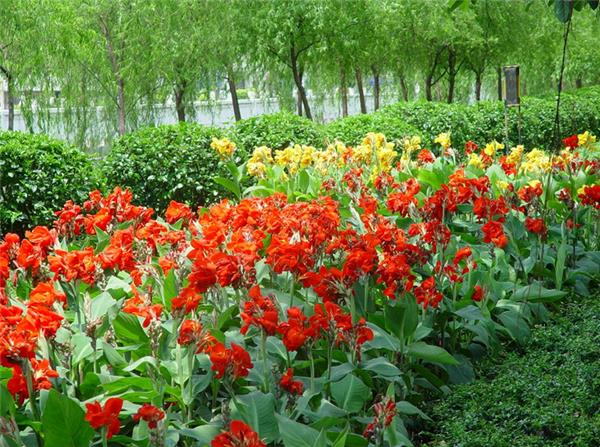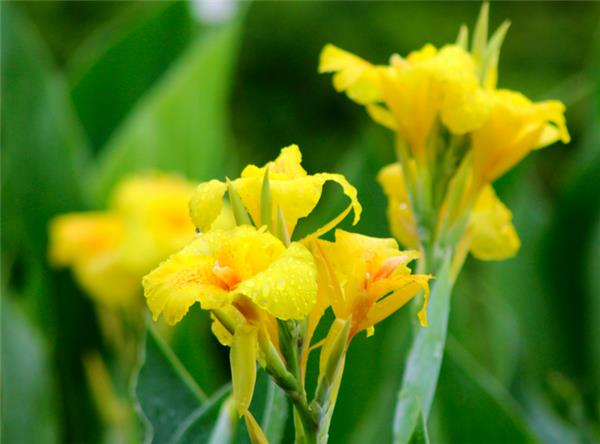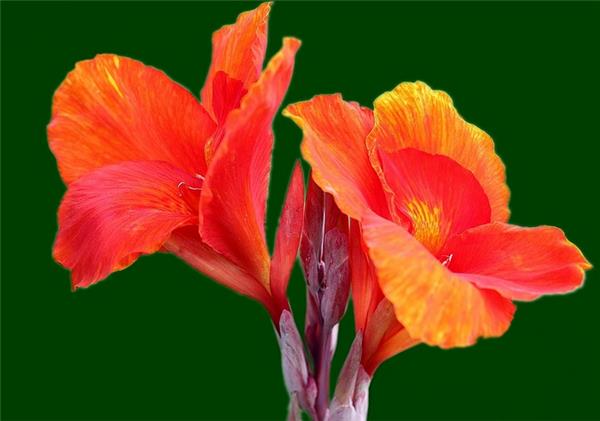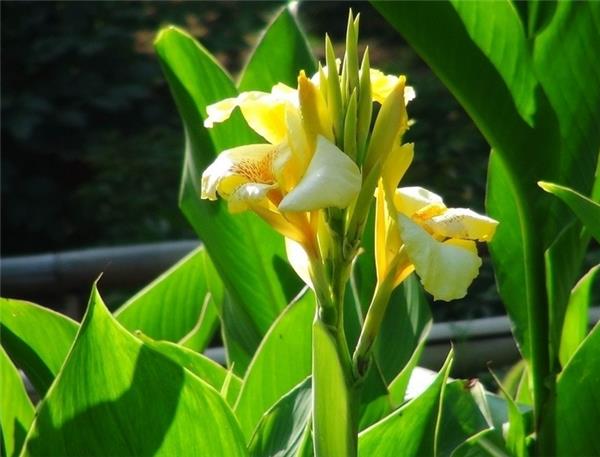What is Canna Flower Language?
Canna is of great ornamental value and can purify the environment, so do you know what the language of canna is?

Canna flower language
The flower language of Canna is: a bright future. Even recruit Keiko, stick it out.
Canna has luxuriant branches and leaves, large and colorful flowers and long flowering period. when it blossoms, it is in a hot season with few flowers, which can greatly enrich the color and seasonal changes in landscaping, and make the landscape outline clear, beautiful and natural. It can not only beautify people's life, but also absorb harmful substances such as sulfur dioxide, hydrogen chloride and carbon dioxide. The resistance is good. Although the leaves are vulnerable, they grow new leaves again after the damage and resume growth quickly. It is an ideal flower for greening, beautifying and purifying the environment.

Canna varieties
1. Safflower canna
Canna flowers red, solitary, bracts ovate, green, flowers are bright red. This kind of flower is small and mainly appreciates leaves.
2. Yellow flower canna
Corolla and staminodes apricot yellow are different from orthodox species. Inflorescence solitary and loose, few flowers, few bracts, flowers large and soft, downward reverse, the lower part is cylindrical, yellowish, lip round.
3. Two-color mandarin duck canna
Cited from South America, it is a rare treasure in the genus Canna. It gets its name because of its bright red and five-star yellow flowers on the same flower stem. What is more valuable is that the petals are half red and yellow, and the same plant is different. What is even more strange is that the red petals are dotted with bright yellow stars, and the five-star yellow petals are decorated with bright red spots. It is not only a good product for potted plants, but also suitable for urban areas, tourist attractions, living areas, parks and street greening.

Culture methods of canna
1. Soil: the requirement of soil is not strict, it grows best in loose, fertile and well-drained sandy soil, and it is also suitable for the growth of fertile clayey soil.
2. Sunshine: sufficient sunlight is required during the growing period, and be sure to receive at least 5 hours of direct sunlight every day. If the environment is too dark and there is not enough light, the flowering will be delayed.
3. Temperature: like warmth, avoid severe cold, the suitable temperature is 16: 30 ℃, 5: 10 ℃ will stop growing, and freezing injury will occur when it is lower than 0 ℃. When flowering, in order to prolong the flowering period, it can be placed in a place with low temperature and no sunlight, and the ambient temperature should not be lower than 10 ℃.
4. Watering: after planting, the rhizome should be watered less before it grows new roots. The basin soil should be moist. The soil is too wet and rots easily. After the scape grows, it should be often watered to keep the basin soil moist. If there is a lack of water, it is easy to appear the phenomenon of "flowers in the leaves" after flowering. Watering should be reduced in winter, based on the principle of "dry and wet".
5. Fertilization: in addition to applying sufficient base fertilizer before planting, thin cake liquid fertilizer should be applied 3 or 4 times a month in the peak growing season. If the scape is not produced 20-30 days before the scheduled flowering period, 0.2% potassium dihydrogen phosphate aqueous solution can be sprayed once to promote the flowering.
6. Insect pests: canna has strong adaptability, extensive management, not spoiled, and few insect pests. Attention should be paid to leaf curling pests from May to August every year so as not to damage its tender leaves and inflorescences. It can be sprayed with 50% dichlorvos 800 times or 50% prednisone EC 1000 times.

The value of canna
Canna can not only beautify people's life, but also absorb harmful substances such as sulfur dioxide, hydrogen chloride, and carbon dioxide. It has good resistance. Although the leaves are vulnerable, they grow new leaves again after being damaged, and soon resume growth. Because its leaves are vulnerable and sensitive, it is called a living monitor to monitor the environment polluted by harmful gases. It can purify the air and protect the environment. It is an ideal flower for greening, beautifying and purifying the environment.
Related
- Wuhan Hospital Iron Tree Blooming Result Was Instantly Frightened by the Gardener Master
- Which variety of camellia is the most fragrant and best? Which one do you like best?
- What is the small blue coat, the breeding methods and matters needing attention of the succulent plant
- Dormancy time and maintenance management of succulent plants during dormancy
- Minas succulent how to raise, Minas succulent plant pictures
- What are the varieties of winter succulent plants
- How to raise succulent plants in twelve rolls? let's take a look at some experience of breeding twelve rolls.
- Attention should be paid to water control for succulent plants during dormant period (winter and summer)
- Watering experience of twelve rolls of succulent plants
- Techniques for fertilizing succulent plants. An article will let you know how to fertilize succulent plants.



